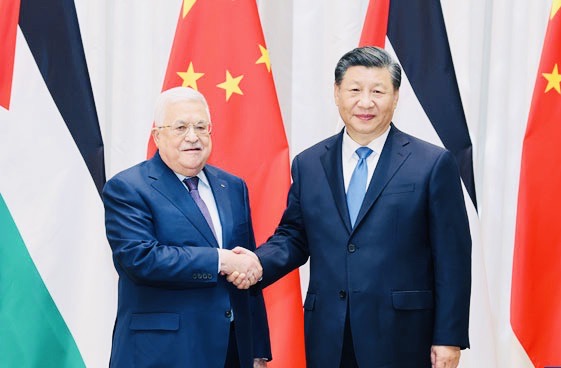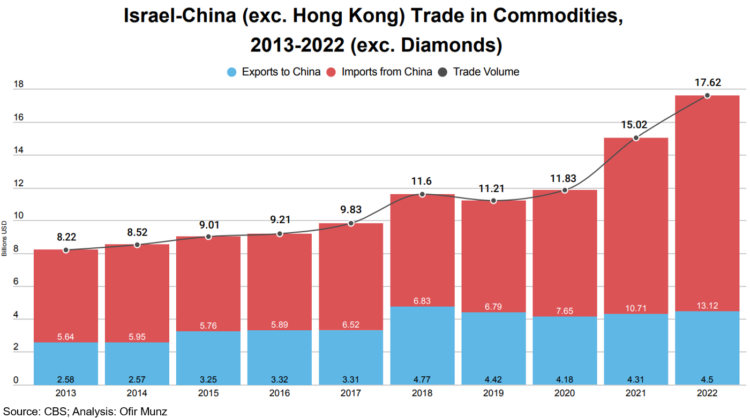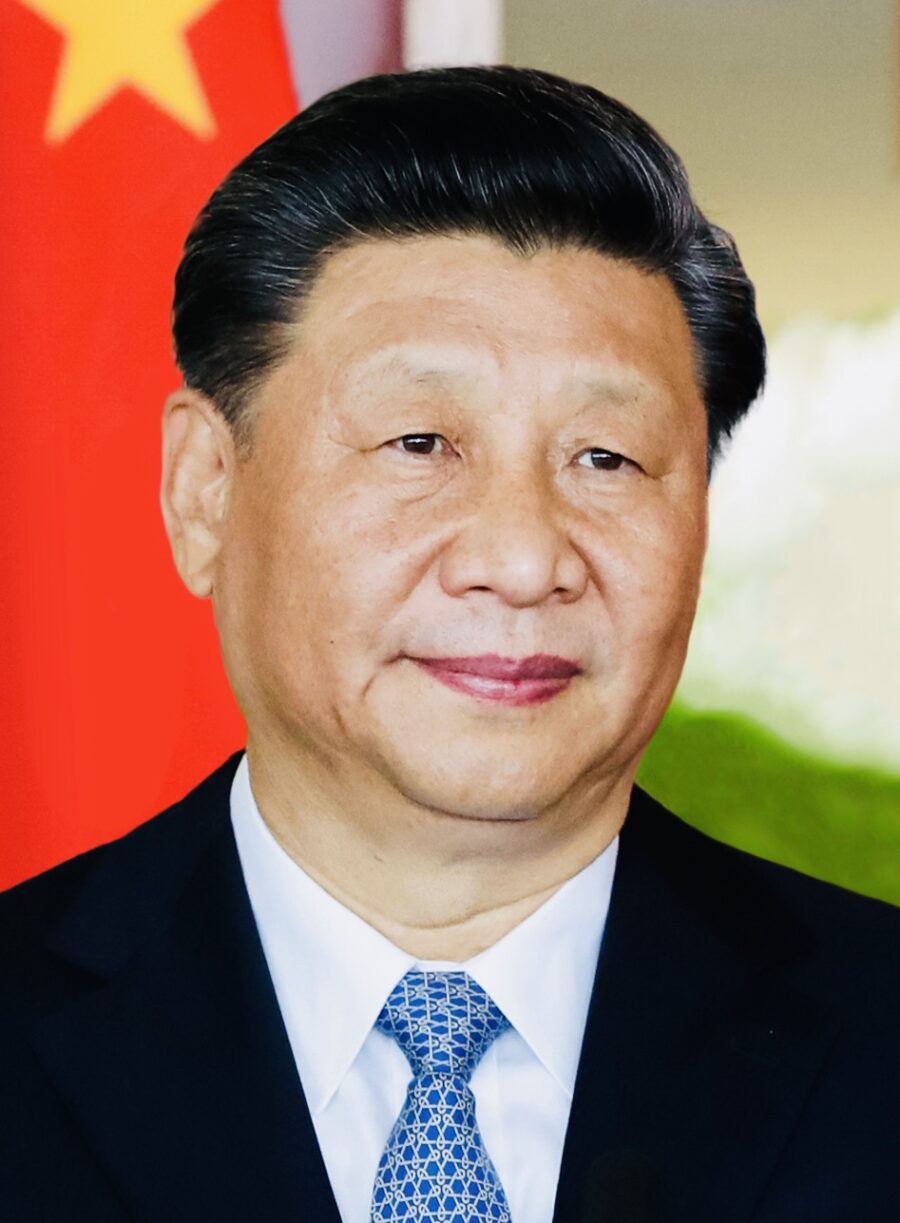China’s supreme leader, Xi Jinping, believes that the balance of power is changing in its geopolitical favor. Convinced that “time and momentum” are on China’s side and that its rival, the United States, is losing stature and influence, Xi is expanding its footprint in the Middle East, a region still largely under the sway of the U.S.
In the most recent manifestation of this incremental phenomenon, Xi welcomed the president of the Palestinian Authority, Mahmoud Abbas, to Beijing on a four-day visit earlier this month.
During Abbas’ trip, his fifth in 19 years, China and the PA signed a “strategic partnership.” No details were disclosed, but Xi described it as an “important milestone in China-Palestine relations that builds on past achievements and heralds a brighter future.”

In his talks with Abbas, Xi presented a proposal for a two-state solution to resolve Israel’s conflict with the Palestinians, calling for the establishment of a Palestinian state in the West Bank and the Gaza Strip, with East Jerusalem as its capital.
“Justice must be returned to Palestine as soon as possible,” Xi was quoted as saying by the Xinhua news agency. “China is willing to play a positive role in helping Palestine … promote peace talks. China stands ready to strengthen coordination and cooperation with Palestine and work for a comprehensive, just and durable solution to the Palestinian question at an early date.”
China’s foreign minister, Qin Gang, reiterated these points when he conferred with his Palestinian counterpart, Riyad al-Maliki.

Having endorsed similar plans in 2013, 2017 and 2021, Xi’s proposal was akin to old wine in a new bottle.
China’s vision was certain to be unacceptable to the current Israeli government, which categorically rejects a withdrawal to the pre-1967 armistice lines, and opposes Palestinian statehood.
But as observers noted, Xi’s meeting with Abbas was more symbolic than substantive and underscored the fact that the Palestinians have lost faith in U.S. diplomacy. More to the point, it was yet another manifestation of China’s ambition to be a major player in the Middle East, like the United States and Russia, which are seasoned hands in the game.
In practical terms, China has made great leaps forward in moving toward this objective in the past two years.
Six months ago, Xi arrived in Saudi Arabia to attend a summit meeting with the Saudis, the Gulf Cooperation Council and the Arab League.
China and Saudi Arabia signed a memorandum of understanding worth tens of billions of dollars in eighteen fields, and Xi proposed ideas for Sino-Arab collaboration through China’s Belt and Road Initiative.

Last week, Saudi Foreign Minister Prince Faisal bin Farhan said that his country’s partnership with China has yielded “significant benefits” and is “likely to grow.”
This is an understatement. China has become Saudi Arabia’s biggest trading partner and buyer of its oil.
Three months ago, in a diplomatic coup, China facilitated secret negotiations between Iran and Saudi Arabia. These talks led to the restoration of their diplomatic relations after a hiatus of seven years. On June 17, the Saudi foreign minister arrived in Tehran, in the latest step to fully restore relations with Iran. He was officially welcomed by Iranian Foreign Minister Hossein Amirabdollahian.
China’s success in forging a Saudi-Iranian rapprochement was regarded as a challenge to U.S. hegemony in the region.
In 2021, China signed a 25-year strategic partnership with Iran, which has been at odds with the United States since the fall of the pro-western Pahlavi monarchy in 1979. A few months ago, Iranian President Ebrahim Raisi visited Beijing.

Far from being ambitious in replacing the United States as the next regional hegemon, China wishes to achieve a “positive balance” in its engagement with all Middle East states, including Israel.
Since 2020, China has become the Arab world’s largest trading partner, with two-way trade surpassing the $330 billion mark last year. China imports more than 70 percent of its oil and 40 percent of its natural gas, with Arab countries like Saudi Arabia and Qatar supplying a substantial proportion of these products.
China’s arms exports to the Middle East have increased. Chinese drones have been purchased by Iran, Egypt, Iraq, Jordan, Morocco and Saudi Arabia.
Abdulaziz Sager, the chairman of the Saudi-based Gulf Research Center, told Al-Monitor that a more assertive China is now emerging: “Beijing is presenting itself as an alternative to Washington in a region that is open to global engagement.”
China established full diplomatic relations with Israel 31 years ago, and since then, bilateral trade has grown tremendously, from $80 million in 1992 to $15 billion in 2021. Last year, Israel exported goods valued at $4.5 billion to China, while it imported Chinese goods worth $13.12 billion.

(Trade with the United States increased during the same period by 26 percent, from $17.43 billion to $22.04 billion, while trade with the European Union rose by 34 percent, from $36.7 billion to $49.19 billion).
Chinese investment in Israel’s high-tech sector has expanded by a substantial margin.
China’s involvement in Israeli infrastructure projects is significant. China has constructed tunnels under Mount Carmel in Haifa and is building a light rail line in Tel Aviv. Last year, the Shanghai International Port Group began operating a section of Haifa’s port.
China’s ambassador to Israel, Cai Run, has said that Chinese-Israeli bilateral relations have been “healthy and stable” and cooperation in various fields has yielded “fruitful results.”

There is, however, one major restraint in Israel’s relationship with China.
The United States, Israel’s chief ally, has made it clear that certain Israeli technology transfers to China could adversely affect its vital security interests. Israel has taken this factor into serious consideration.
According to the Tel Aviv-based Institute for National Security Studies, “Israeli companies could face difficulties exporting microchips and other advanced technological equipment because of the tension between the superpowers and American restrictions in sensitive areas. The export of electronic components makes up more than half of all of Israel’s exports to China and the concern is that Israel’s relative advantage in exporting technology could limit exports to China …”
China’s close ties with the Arab world, the Palestinian Authority and Iran has tarnished its image in Israel to some extent, but this perception has not interfered with Israel’s interest in penetrating China’s vast and lucrative market.
